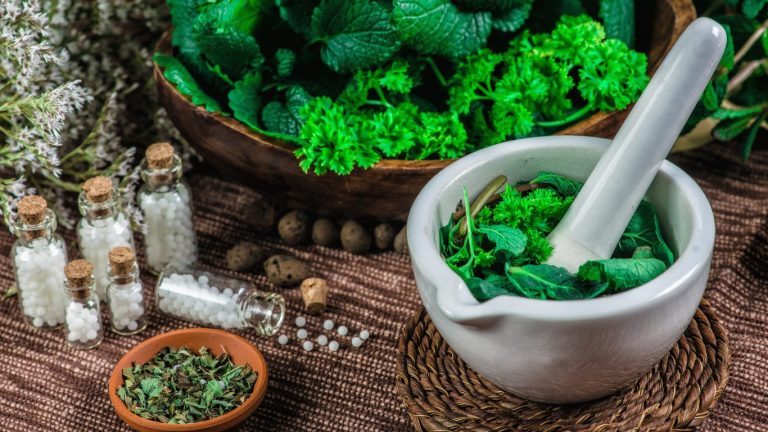This article on homeopathy explains the natural healing process of homeopathy and how it may help your family.
What is homeopathy?
Homeopathy is essentially a natural healing process, providing remedies to assist people to regain health, by stimulating the body’s natural forces for recovery. It concentrates on treating the whole person, rather than just the disease.
Homeopathy has the ability to resolve a great number of ailments in people and animals, without causing side effects or interfering with the action of other medications. There are many conditions that do not respond to ordinary medication that can be helped by homeopathy.
Generally people often want help with day to day stress, general illnesses, chronic conditions and even terminal illness. Homeopathy is a gentle, safe and effective solution.
Homeopathic medicines are made from natural substances by a special process using:
- plants
- minerals
- animal products
Homeopathic medicines are extremely dilute. Unlike conventional medicine, the more diluted the medicine the greater the potency or strength.
How can homeopathy help my child?
Homeopathy can be a gentle, easy and effective way to help children with their illnesses or health issues. It has been used to treat a wide range of conditions such as hayfever, colds and flus, whooping cough and insomnia. Homeopathy can also be beneficial for children with behavioral or developmental problems and adolescents with study and exam stresses.
Positive results from homeopathy can mean drugs or medicines may not need to be used. Homeopaths may also suggest lifestyle or dietary changes if necessary.
How can homeopathy help me?
Homeopathy offers a holistic approach to health, addressing a wide range of physical and emotional conditions. It is commonly used to treat ailments such as asthma, eczema, digestive issues, migraines, and stress-related problems. Homeopathy can also provide relief for chronic conditions and is known for its gentle, non-invasive remedies.
Homeopathic treatments can be used in conjunction with conventional medicine. It’s important to inform both your doctor and homeopath if you are using multiple forms of treatment to ensure they work effectively together.
What should I expect during our first visit to a homeopath?
For your first visit, the homeopath will ask detailed questions about your lifestyle, emotional, mental and physical health, levels of stress, any fears you may have and reactions to aspects of the environment.
This level of information is required in order to build up a comprehensive profile of your / your child’s symptoms. On the basis of this profile, the homeopath will work out your constitutional ‘type’, which enables them to choose the most appropriate remedy.
The homeopath will prepare a remedy to take home (this can be in the form of drops or small pills) as it will need to be administered on a regular basis.
Normally, remedies need to be taken 30 minutes before or after drinking or eating. If it is your child that is being treated you will need to administer them onto (or under – whichever is easiest) your child’s tongue, either by teaspoon or dropper (pills and granules simply dissolve). The remedies are not supposed to be directly handled in any way.
Most children can do this quite easily as the taste and sensation is fairly bland.
You also need to be aware that strongly flavoured substances, such as tea, coffee and peppermint (don’t forget that toothpaste!) may need to be avoided for the duration of homeopathic treatment, as they can affect the effectiveness of a remedy.
How do I find reputable homeopathy care?
Generally speaking, there are two types of homeopaths:
- Classical homeopaths typically prefer to use one remedy at a time and then monitor any effects.
- Complex homeopaths usually use a combination of remedies.
The remedies can be given in a variety of forms – liquid, granules, tablets or small pills.
Apart from any personal preferences you may have, it can be a good idea to check out referrals from friends.
Another reliable source is www.homeopathy.co.nz which is the website for the NZ Council of Homeopaths. Homeopaths registered with this professional body are required to undertake ongoing training, adhere to rules of practice and a code of ethics. The entry level to this register is NZQA level 7.
Other natural health practitioners, health stores and some GPs can also point you in the direction of a reputable homeopath.
How much does homeopathy cost?
The cost of a consultation with a Homeopath can vary throughout the country. The average consultation for adults is $100 for the first consultation and approximately $80 for a follow-up appointment.
Children’s consultations range from $50 for the first visit and $40 for a follow up. It always pays to check the exact costs of consultation, prior to your appointment.
A typical consultation can take anywhere from 1-2 hours for an adult, but usually involves less time for children. If follow-up appointments are required – to check the correct remedy has been prescribed and that it is effective – they tend to be shorter than your initial visit. More consultations may be needed for a long-term condition.
Great homeopathy websites
This is the official website of the NZ Council of Homeopaths and it is very easy to locate the nearest, registered Homeopath in your area. The website has an excellent FAQ section and other information, including their complaints procedure.
For more information on hayfever and other allergic conditions, visit our section on Allergies





